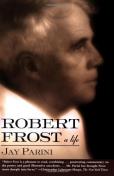BKMT READING GUIDES
Robert Frost: A Life
by Jay Parini
Paperback : 0 pages
1 club reading this now
0 members have read this book
Introduction
Editorial Review
Robert Frost, the farmer-poet of New England, actually spent his formative early years in San Francisco. His mother moved the family east after the death of her husband--a hard-living journalist from whom Robert took his willful perversity. He attended Dartmouth and Harvard, leaving both prematurely, and after putative stabs at teaching and journalism became a poultry farmer in New Hampshire. It took a trip to England in 1912 (to live "under thatch") for his poetry finally to be published, and when he returned to America in 1915 his reputation had preceded him. Until his death in 1963, he worked assiduously at consolidating his position as America's premier voice; reading at Kennedy's inauguration and meeting Khrushchev were just two of the scenes he stole. So why does Jay Parini need to reclaim him?The answer lies with Lawrance Thompson. Thompson was one of Frost's most earnest disciples, and for years the poet, ever eager to shape his own image, allowed him a Boswellian intimacy. Unfortunately, Thompson came to despise his former mentor, and his exhaustively documented volumes portray Frost as a kind of solipsistic monster, in marked contrast to the awe with which he had previously been described. Parini, also a biographer of John Steinbeck, in a wave of perspective seeks a corrective to Thompson's bile. His writing is intelligent yet breathlessly generous, and he is at his best when considering the poems themselves. He rightly ascribes to Frost the innovation of the colloquial voice in serious verse--a legacy that appears immense today when so much contemporary poetry consists of little else. Frost's mastery lay in the freedom he found within conformity and the dark corners he discovered by probing, which contribute to a melancholic spirituality beyond the rusticity for which he is popularly celebrated. While Thompson's egg is cracked and dry, Parini prefers a softer boil, and his elegantly reverential tone is imbued with a perception that reminds readers how great a poet Frost remains. The clergyman who advised him at an early age that his verse was "too close to speech," and thus gave him his voice, deserves eternal gratitude. --David Vincent, Amazon.co.uk
Discussion Questions
No discussion questions at this time.Book Club Recommendations
Recommended to book clubs by 0 of 0 members.
Book Club HQ to over 88,000+ book clubs and ready to welcome yours.
Get free weekly updates on top club picks, book giveaways, author events and more








